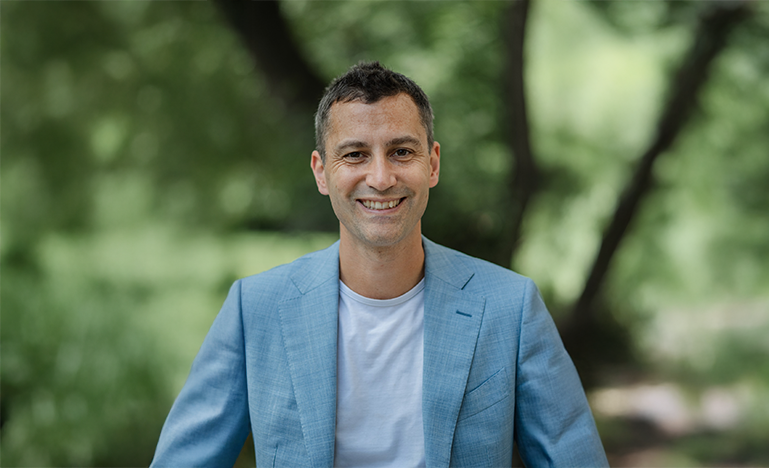Committed to solving the climate crisis
Newly elected Liberal MP Eric St-Pierre is hoping to draw on his environ-mental and Aboriginal law experience on Commons committees

Eric St-Pierre can remember days walking to school in Sudbury, Ont. when the pollution was palpable.
“I could taste sulphur.”
He would go on to become a lawyer focusing on environmental and Indigenous law before moving to the nonpartisan Trottier Family Foundation in Québec, where part of his role was leading its climate efforts.
“I was always very sensitive to environmental issues because it was literally in my backyard. I could see the smelters. I could smell the air.”
St-Pierre says the city, known for its nickel and copper deposits, was still suffering the effects of open-pit mining from decades before.
“I saw the remnants of that in the ‘80s and ‘90s, where you just see the impact of natural resource exploitation … on the natural environment.”
Sudbury today is a dramatic regreening success story thanks to massive tree-planting and cleanup efforts led by a restoration ecologist at Laurentian University, citizens, industry, and government.
St-Pierre’s interest in social and political issues started as a teenager.
“I think it came a little bit from my upbringing, and I think it was just innate.”
Despite being elected as the new Liberal MP for the Montréal-area riding of Honoré-Mercier last April, he says he never saw himself as a future politician.
But others did.
“People around me my entire life have always told me that I would be in politics. An uncle of mine would say: ‘Oh, you’re going to be prime minister one day.’”
St-Pierre’s horizons broadened after high school when he bought a backpack and a ticket to Europe. He experienced different cultures in more than a dozen countries, from Belgium to Italy to Germany, and met students from around the world. Four months later, he came back ready to enroll in political science at Concordia University.
During his first week on campus in September 2002, a visit by Benjamin Netanyahu, who was then the former Israeli prime minister, sparked pro-Palestinian protests.
“I was literally walking to class, and riot police were arresting people left and right. Windows were being shattered,” St-Pierre recalls.
“So that was my start to studying political science.”
He got involved in student politics and international issues, spending a summer in Uganda as a volunteer for refugees and internally displaced citizens.
After graduation, St-Pierre worked in the Solomon Islands in the South Pacific as part of a federal international youth internship program.
He worked on Indigenous issues, reconciliation and restorative justice.
“My interest in law was emerging.”
St. Pierre graduated from McGill University in 2010 with a concurrent degree in common law and civil law. His early practice at a large law firm involved work on Indigenous files such as mining, constitutional, and Charter claims.
“I found it very rewarding,” he says. “I’ve always been interested in representing communities and people that are underrepresented.”
He practised Aboriginal and environmental law at a boutique firm before heading to court as a litigator representing tenants threatened with eviction.
St.-Pierre’s wife, Sylvie, is a former climate analyst and the daughter of Lorne and Louise Rousselle Trottier. Her father co-founded Matrox, a computer graphics company.
Inspired by Bill Gates and other Big Tech philanthropists, the Trottiers established a private charity in 2000.
St-Pierre became executive director of the Montréal-based Trottier Family Foundation in 2016. Along with Sylvie and other family members, he helped the foundation grow its staff to about 10 as it refocused on supporting innovation in health, education, science, and the environment.
It is now one of the best-known foundations of its kind in the country.
“I quickly realized that the work I could do in philanthropy would probably be a lot more influential than I could ever do in law,” St-Pierre says, noting last fall, he worked with several like-minded foundations to “mobilize $400 million for climate philanthropy.”
He crossed paths with Mark Carney in climate finance circles and was intrigued when he won the federal Liberal leadership. When the party approached St-Pierre to run last spring, he jumped at the chance.
“I told my team on a Tuesday that I was leaving the foundation, and then Friday, I was starting my campaign,” he says. “I didn’t have a five-year plan. I had maybe a 30-day plan.”
Immigration and public transportation are among his riding’s priorities, and he also hopes to use his environmental and Aboriginal law experience on Commons committees.
“I remain very passionate about trying to solve the climate crisis. I’ve got two young daughters who are six and nine. I really believe we have to do everything possible to ensure they have a safe future.”
Parliament Hill can be a bit of a pressure cooker, but if he gets stressed, St-Pierre can always go for a little run. An ultramarathoner, he ran 81 kilometres in about 10 hours last January in Utah – while recovering from pneumonia.
“I was a little stubborn and decided to run it anyway,” he says.


